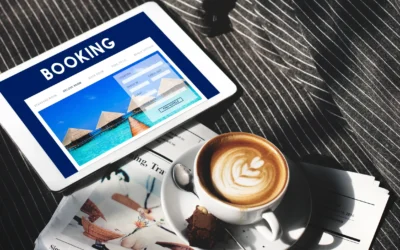Strategies for Boosting Hotel Reservation Rates

Boosting hotel reservation rates is essential in today’s competitive hospitality industry.
This article provides practical advice and inspiration, focusing on the power of digital marketing and Search Engine Optimization (SEO) to attract more guests.
By highlighting the importance of a strong online presence, it explores effective strategies to improve visibility, guest engagement, and overall occupancy levels.
Table of Contents
SEO and Digital Marketing Strategies for Hotels
In the dynamic hospitality sector, mastering SEO is crucial for hotels looking to enhance online exposure and increase bookings. Here are key tactics:
- In-depth Keyword Research: Analyze keywords that potential visitors use when searching for accommodations, including both basic terms and long-tail keywords reflecting specific queries.
- Comprehensive Website Optimization: Beyond technical SEO, publish high-quality content that adds value for visitors, such as blogs on local attractions, amenities, and events. According to HotelMinder’s Digital Marketing Guide, hotels that consistently blog enjoy significantly higher website traffic.
- Enhanced Local SEO Practices: Claim and optimize listings on platforms like Google Business Profile and other local directories. Encourage positive guest reviews and respond promptly to feedback to improve local search rankings. The Search Engine Journal notes that local SEO can be one of the strongest drivers of bookings.
- Targeted Email Marketing Campaigns: Segment your audience and send personalized offers to past and potential guests. Tailored communication significantly improves engagement and conversions.
- Strategic Social Media Engagement: Showcase unique hotel experiences through engaging posts, contests, and guest photos (with permission). Highlight special promotions to build buzz.
- Optimized Paid Advertising: Use PPC and social media ads to target specific demographics, interests, and geographic areas. Implement remarketing campaigns to re-engage visitors who did not complete a booking. The HotelTechReport highlights remarketing as one of the most effective conversion boosters.
- Performance Measurement: Regularly monitor campaigns with tools like Google Analytics. Use insights to refine strategies and focus on what works best.
A thoughtful combination of broad visibility and targeted outreach creates a compelling online presence that inspires bookings and builds loyalty.
Direct Booking Incentives
Encourage guests to book directly on your website by offering exclusive perks such as complimentary breakfast, late check-out, free upgrades, or bundled experiences with local attractions.
According to HiJiffy, highlighting direct booking benefits helps reduce dependency on OTAs while strengthening brand loyalty.
Ensure the booking process is seamless, fast, and mobile-friendly to reduce friction. These advantages motivate guests to bypass third-party platforms and book directly with your hotel.

Improving Online Reputation and Guest Reviews
A strong online reputation drives trust and bookings. Focus on delivering exceptional service and amenities, then actively manage guest feedback:
- Respond to reviews on platforms like TripAdvisor and Google, showing appreciation and addressing concerns.
- Collect feedback during or immediately after a stay to resolve issues quickly.
- Encourage happy guests to leave reviews, possibly with small incentives.
- Build an engaged community on social media and analyze feedback trends to identify areas of improvement.
As WebFX explains, review management is one of the top digital marketing strategies for hotels.
Loyalty Programs and Personalization
Rewarding returning guests through loyalty programs encourages repeat bookings. Offer points redeemable for free nights, upgrades, or perks.
For example, Stash Hotel Rewards has built a successful program for independent hotels, showing how loyalty can thrive outside big chains.
Combine this with personalized marketing—such as tailored offers based on guest history and preferences—to make visitors feel valued.
This dual strategy builds long-term loyalty and increases booking rates.
Website and Mobile Optimization
A mobile-friendly website is non-negotiable. Responsive design ensures smooth navigation across devices. To optimize further:
- Prioritize fast-loading pages and intuitive navigation.
- Simplify the booking process with minimal steps.
- Use high-quality images and detailed descriptions of rooms and amenities.
- Add clear calls-to-action and visible customer support options.
As HotelTechReport notes, mobile optimization directly influences guest trust and conversion rates.

Seasonal Promotions and Packages
Create seasonal offers to attract guests year-round. For example:
- Winter Wonderland: Discounted long stays with complimentary hot chocolate.
- Summer Escape: Special rates on sea-view rooms and free beach equipment rentals.
Partner with local event organizers to design packages that include tickets to attractions or festivals, enhancing guest experiences while strengthening community ties.
Conclusion
Boosting hotel reservation rates requires a multifaceted approach that blends SEO, digital marketing, direct booking incentives, strong online reputation management, loyalty programs, mobile optimization, and seasonal promotions.
By focusing on these strategies, hotels can increase visibility, build guest loyalty, and drive bookings throughout the year.
Frequently Asked Questions (FAQ)
How can hotels increase direct bookings?
Hotels can boost direct bookings by offering exclusive perks such as free breakfast, room upgrades, or flexible check-out times.
A user-friendly, mobile-optimized website and clear booking incentives also encourage guests to book directly instead of through third-party platforms.
Why is SEO important for hotels?
SEO helps hotels appear higher in search results when potential guests are looking for accommodations.
Optimized content, local SEO, and strong keyword targeting improve visibility, attract more traffic, and ultimately increase reservation rates.
What role do guest reviews play in hotel bookings?
Guest reviews strongly influence traveler decisions. Positive reviews build trust and credibility, while responding to negative ones shows commitment to service improvement.
An active review management strategy can significantly improve booking rates.
What kind of loyalty programs work best for hotels?
Successful loyalty programs often reward guests with redeemable points for stays, upgrades, or discounts.
Personalized offers based on past behavior make guests feel valued and encourage them to return.
How can social media help hotels get more reservations?
Social media platforms are ideal for showcasing unique experiences, running contests, and sharing guest stories.
Engaging content and targeted campaigns help hotels connect with new audiences and drive more bookings.
Why is mobile optimization so critical in hospitality?
Most travelers use smartphones to research and book hotels. A mobile-friendly website with fast loading times, intuitive navigation, and a simple booking process reduces friction and increases conversions.
What are seasonal hotel promotions?
Seasonal promotions are time-sensitive offers tailored to holidays, events, or seasons—such as “Summer Escape” packages or festival-inclusive deals.
They create urgency, attract specific guest groups, and help fill rooms during slower periods.



